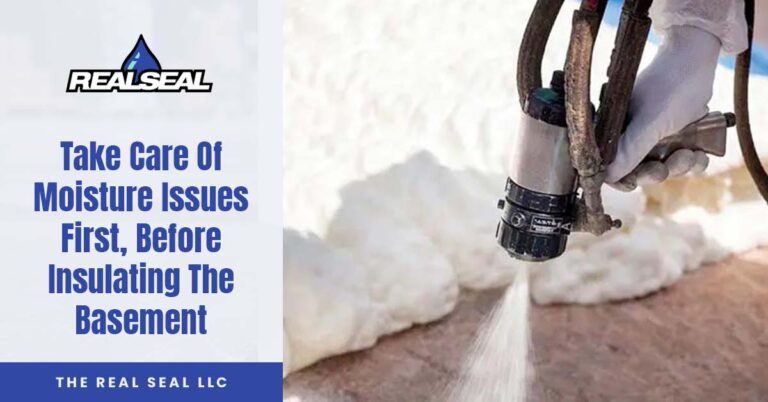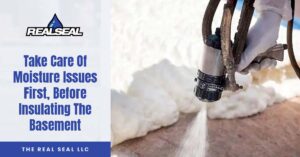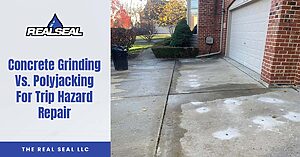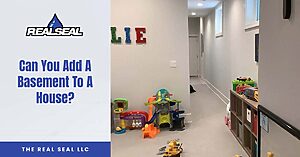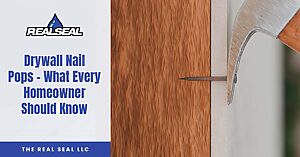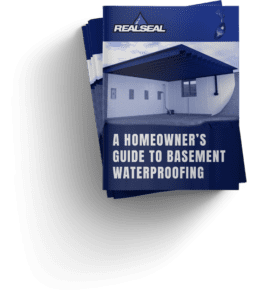Looking for information about basement insulation? If so, don’t hit that back button because you’re in the right place. This article will cover what basement insulation is, its benefits, the most important thing you need to do before insulating your basement, and more.
What Is Basement Insulation?
The term “basement insulation” means covering the basement walls with insulating materials to prevent heat loss and moisture build-up. Insulating your basement has several benefits, including lower energy bills, increased comfort, improved indoor air quality, and reduced risk of mold growth and structural damage. We’ll talk more about these benefits below.
The Benefits Of Basement Insulation
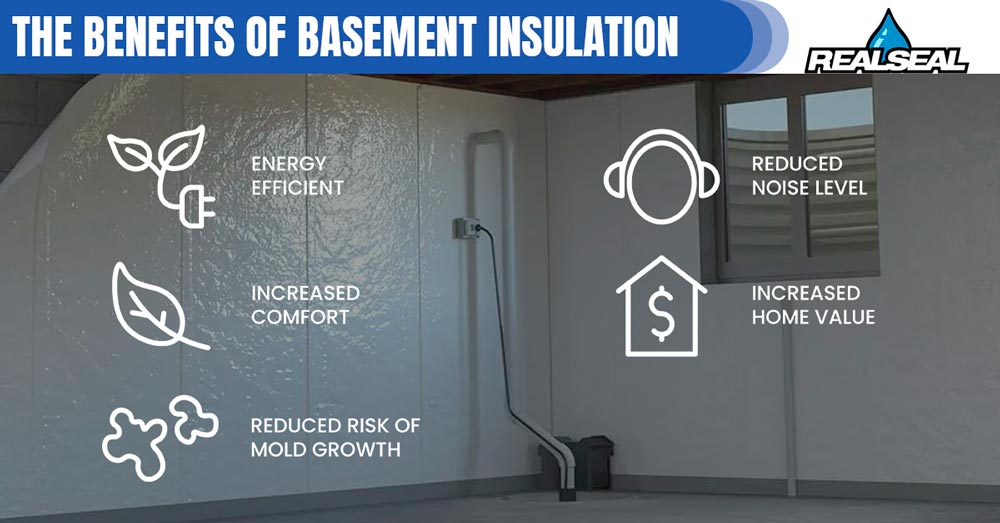
Basement insulation offers numerous benefits, making it a worthwhile investment for homeowners. These include the following:
- Increased energy efficiency – Insulating your basement can significantly increase your home’s energy efficiency, ultimately decreasing your energy bills and making your home more comfortable to live in.
- Increased comfort – One of the primary benefits of basement insulation is that it helps regulate your home’s temperature. Basements tend to be colder than the rest of the house. If you don’t properly insulate your basement, this cold air can seep into other areas of your home, making it harder to maintain a consistent temperature. By properly insulating your basement, you can create a more even distribution of heat throughout your home, reducing the energy needed to maintain your desired comfort level.
- Reduced risk of mold growth – Additionally, basement insulation can help reduce moisture in your home. Moisture can lead to numerous problems, such as mold growth, which can be hazardous to your health. Insulation helps prevent moisture build-up by creating a barrier between the interior and exterior of your home, effectively stopping water vapor from entering.
- Reduced noise level – Basement insulation can also help reduce noise levels in your home. If your basement isn’t insulated, any sound from outside or within the home can reverberate throughout your living space. Proper insulation can help absorb and dampen this sound, making your home quieter and more peaceful.
- Increased home value – Finally, basement insulation can increase the value of your home. Insulation is a critical factor that prospective home buyers consider when evaluating a property. A properly insulated basement will make your home more attractive to buyers, ultimately increasing its overall value.
Take Care Of Moisture Issues First, Before Insulating The Basement
When insulating your basement, you must first take care of any basement moisture issues. Basement moisture problems can significantly reduce your insulation’s efficiency, leading to other issues, such as mold growth, unpleasant odors, and potential structural damage.
So, where does basement moisture come from?
There are several common sources of moisture in basements, including the following:
- Water entering through the foundation wall – Poor drainage around the foundation can cause hydrostatic pressure to build up and push against foundation walls. Hydrostatic pressure is strong enough to push water through invisible cracks in the foundation and into your basement.
- Internal moisture sources – These include cooking, showering, and unvented clothes dryers.
- Open basement windows – Open basement windows allow warm air to flow in and condense on cooler surfaces.
- Window wells – Poor window well drainage can cause water to leak into your basement.
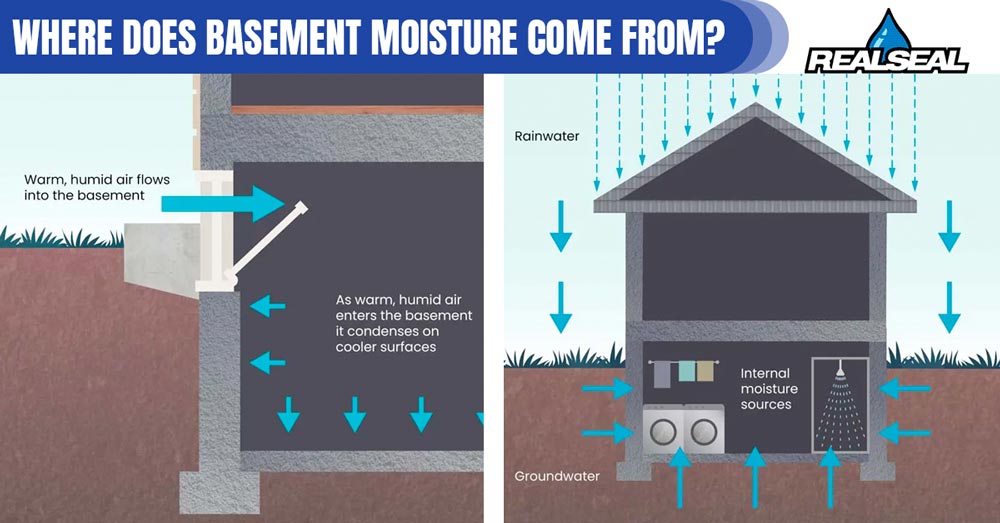
Effective methods for reducing basement moisture
Install a drain tile system
Installing a drain tile system is the best way to reduce basement moisture. A drain tile system doesn’t merely put up a barrier to keep moisture out of your basement; it prevents moisture from building up in the ground around the foundation in the first place.
There are two types of drain tile systems, exterior and interior. An exterior drain tile system is installed around the outside perimeter of the foundation at the footing level. The interior variety goes around the inside perimeter of the basement. Installing an interior drain tile system means using a jackhammer to break up the floor.
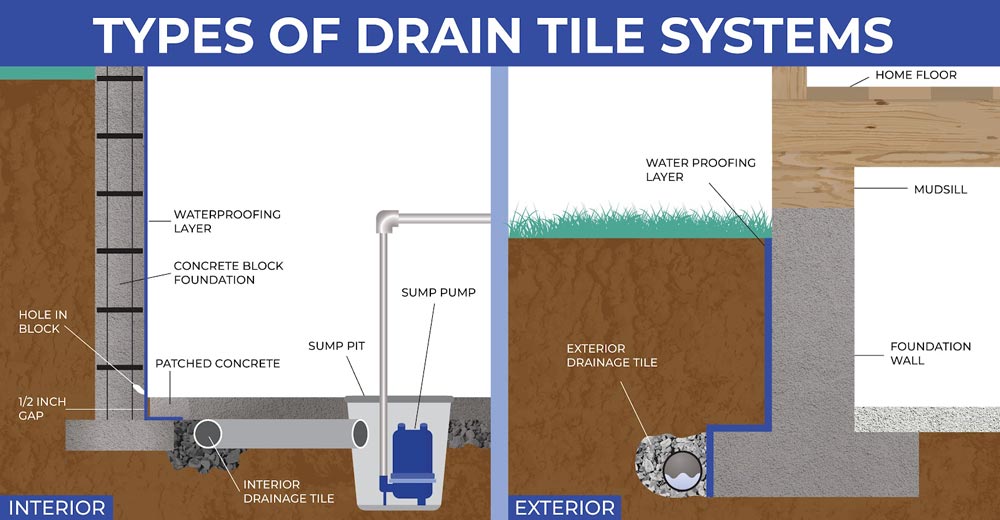
The general install procedure for an exterior drain tile system is as follows:
- The soil around the perimeter of the foundation is excavated down to the footing.
- A shallow trench is dug around the foundation perimeter and filled with gravel.
- A perforated drainage pipe is placed into the trench and covered with more gravel.
- The excavated soil is replaced.
Excess ground moisture will now find its way into the perforated drainage pipe and, from there, to a sump pit. Once the sump pit fills with water, a sump pump turns on and releases the water a safe distance from the foundation.
For more information, see How A Drain Tile System Can Save You Money.
Regrade the yard around the foundation
If the yard surrounding the foundation is not sloped correctly, groundwater will drain toward the foundation and then eventually seep into the basement, causing moisture problems. The yard around the home should slope away from the foundation. You could ask a professional landscaper for help, or it might be a good DIY project.
Use downspout extensions
Downspout extensions are an excellent investment for homeowners looking to prevent moisture build-up in their basements. The primary function of a downspout extension is to collect water from the roof and redirect it at least 15 feet away from the home’s foundation. This action ensures that water does not pool or stagnate near the foundation and, from there, find its way into your basement.
Clean your gutters regularly
When gutters are clogged with leaves, twigs, and dirt, they can cause water to spill over the side of your house and soak into the ground around the foundation. From there, it could penetrate the foundation wall and seep into the basement.
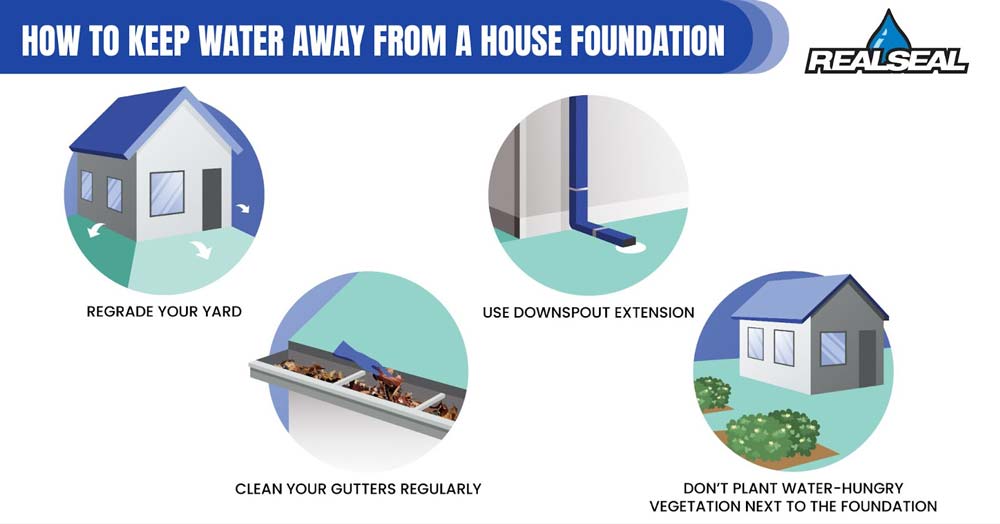
We can’t emphasize this enough: It’s critical to address any moisture issues first to ensure that your basement insulation is effective and long-lasting.
For more information, see 7 Basement Waterproofing Solutions That Work.
Types Of Basement Insulation
With a range of basement insulation options available, it’s essential to understand the different types of insulation and their respective benefits.
Spray foam insulation is a versatile basement insulation type that can be applied in various forms, such as open-cell and closed-cell. Open-cell spray foam insulation is a lighter, softer material for insulating hard-to-reach areas. On the other hand, closed-cell spray foam insulation is denser and more rigid, providing excellent thermal insulation and structural support.
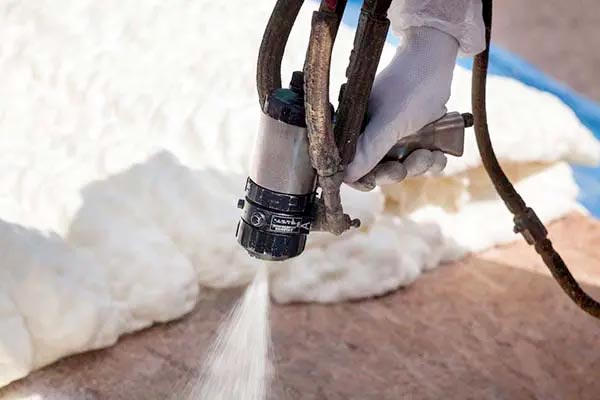
Rigid foam board insulation is another suitable option for basement insulation. This type of insulation is a compressed foam board made of polystyrene, polyisocyanurate, or other materials that provide high R-value insulation. It’s also resistant to moisture and doesn’t deteriorate over time.
Another type of basement insulation is fiberglass batt insulation, which comes in pre-cut panels made of fiberglass or mineral wool. Batt insulation is relatively easy to install and provides excellent thermal performance, blocking sound and heat transfer. However, this type of insulation may not be the most suitable for basements because it’s difficult to install correctly on uneven and irregular surfaces.
Another reason why fiberglass batt insulation is not the best choice for basement insulation is because it tends to absorb moisture. This can lead to mold growth and degradation of the insulation. Fiberglass batt insulation also has a relatively low R-value compared to other types of insulation, meaning that it is not as effective in preventing heat loss and energy waste.
Another option for basement insulation is blown-in insulation, which is composed of loose-fill cellulose, fiberglass, or mineral wool particles. This insulation type is ideal for attaining high R-values and fills gaps and crevices effectively. Blown-in insulation also has soundproofing properties and is fire-retardant.
DIY Basement Insulation or Let A Professional Handle It?
When it comes to insulating your basement, you need to make sure the job is done right. As a homeowner, you might feel tempted to take on the project yourself to save money, but it’s essential to understand the potential risks of DIY basement insulation. Insulating a basement requires training, experience, and the proper equipment.
One of the most significant advantages of hiring a professional to insulate your basement is that they have the experience required to properly seal all the unique areas of your basement and eliminate any potential air leaks.
Another reason to choose a professional to insulate your basement is that they have all the necessary safety gear and protocols to protect themselves and your home.
Working with a professional to insulate your basement also offers the benefit of high-quality materials and techniques. Insulating materials vary in their R-value, which measures how effectively they prevent energy loss. Professionals have access to various insulation materials, including spray foam and rigid foam, that they can select based on the specific needs of your home. They also understand how to install these materials correctly to achieve maximum effectiveness.
Finally, hiring a professional to insulate your basement can save you time and money in the long run. While doing it yourself may be cheaper, you might make mistakes or use the wrong materials, which can lead to problems down the line. A professional can do the job efficiently and effectively, saving you the hassle and stress of a DIY project while ensuring that your home is as energy-efficient and healthy as possible.
Note that The Real Seal does not insulate basements. We do waterproof basements though! After we’ve waterproofed your home’s basement, it will be ready for insulation.
If you’re considering basement waterproofing for your Chicagoland home, contact The Real Seal today to schedule an evaluation and receive an estimate.
